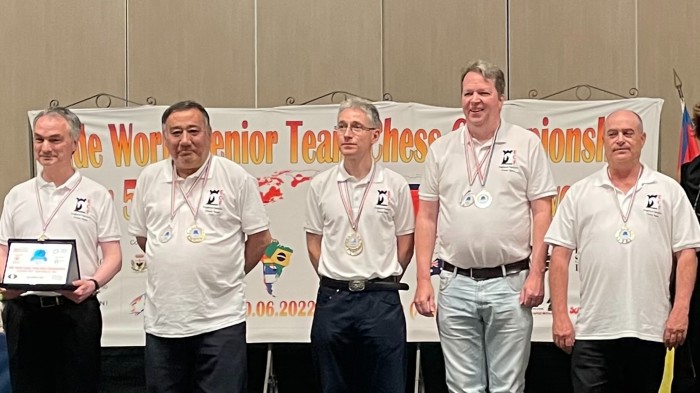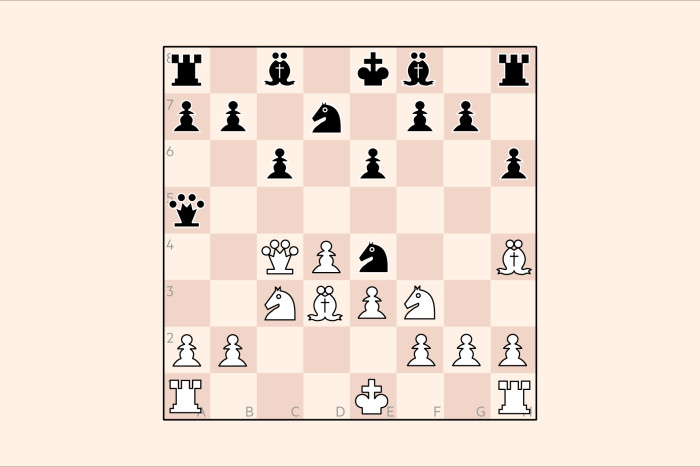Chess: England seniors win three world titles while Nepo races clear

England seniors achieved a historic double on Wednesday, recalling the decades of the 1970s and 1980s, when they captured the over-50 and over-65 world team championships at Acqui Terme, Italy. Both England teams led from start to finish over nine rounds, and their only defeat came in the final 65-plus round with first place already secure.
For three of England’s over-50s, the outcome provided consolation after painful defeats in major finals of long ago. Nigel Short famously lost to Garry Kasparov in 1993, Michael Adams was beaten in the Fide world final in 2004, while Keith Arkell missed the 2014 World Senior crown on tie-break.
Adams and Short, the two all-time greats of English chess whose achievements in a more competitive era have outpaced the 19th-century icons Howard Staunton and Joseph Blackburne, made the difference as their superior class told in what proved to be a close race with the USA’s squad of Soviet-trained ex-Russians.
Adams won two memorable and precisely calculated endgames from seemingly drawn positions, the first with knights and pawns to save what proved to be the gold medal match against the Americans, and the second with rooks and pawns against Italy. These and England’s other games can be viewed in the games section of Chess-Results.
England over-65s, with seven wins, one draw, and a final round loss to the bronze medallists Israel, were boosted by their high-class top boards, John Nunn and Paul Littlewood. Nunn has achieved eminence as a chess writer, player, publisher and world problem solving champion, while Littlewood is a former British champion.
There was a strange incident in round eight, where three Swiss players defaulted due to Covid-19 and Nunn decided not to play on his own, resulting in an officially approved 3-1 scoreboard with all four games still in their starting positions. Nunn otherwise scored 6.5/7 and won the top board medal despite his default.
Double gold is a major achievement for these players, but it will also be a nostalgic and evocative moment, one of the last hurrahs for the gifted 1970s and 1980s generation who, for a few exciting years, made England the No2 chess nation after the mighty USSR.
England over-50 women were also awarded a world title despite being the only team in their category. Seeded 17th, they finished 13th and defeated male opponents from Norway and Poland.
Ian Nepomniachtchi, who six months ago was crushed 4-0 in his challenge to Magnus Carlsen, was poised for a second attempt at the world crown after he raced clear in the Candidates at Madrid. The Russian, who plays under a neutral Fide flag, totalled an impressive 7/10 with only four rounds remaining.
Nepomniachtchi was bold in the first half of the tournament, winning three games by attacks down the h file against castled kings, but he then switched to a safety-first strategy, reckoning that draws in the remaining rounds will be enough for a winning total.
The Skolkovo Foundation Zhores super-computer has aided the 31-year-old Muscovite’s opening preparation. He has also been helped by unused preparation which had been ready for Carlsen and by his reliance on his trusty Petroff Defence 1 e4 e5 2 Nf3 Nf6. Both Americans came up with prepared anti-Petroff novelties, but both erred after establishing opening advantages.
The Candidates saga is likely be far from over even if Nepomniachtchi finishes first after the final round on July 4. Carlsen has stated that he is “unlikely” to defend his crown against a player from his own generation, and if that happens the rules state that there will be a match for the title between the top two Candidates finishers.
Puzzle 2475

Andrew Ledger v Andrew Paterson, 4NCL 2022. Black to play. Black’s next move was plausible, but it led to immediate disaster. With this clue, can you work out what happened?
Click here for solution
Comments